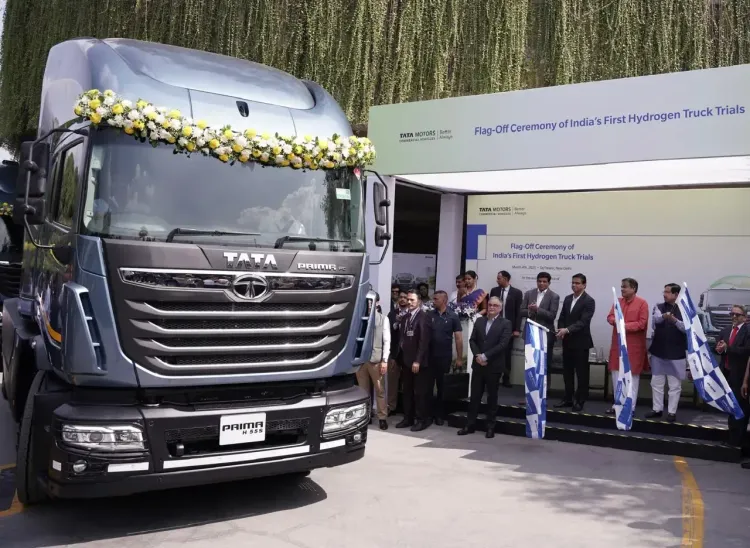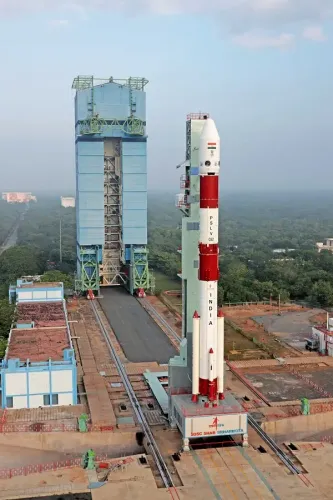Tata Motors Initiates Groundbreaking Hydrogen Truck Trials in India

Synopsis
Key Takeaways
- Tata Motors initiates hydrogen truck trials.
- 16 hydrogen-powered trucks will be tested.
- Trials funded by the National Green Hydrogen Mission.
- Vehicles designed for long-distance cargo transport.
- Enhanced safety and driver comfort features.
New Delhi, March 4 (NationPress) Tata Motors, the largest commercial vehicle producer in India, has embarked on its inaugural trials of hydrogen-powered heavy-duty trucks on Indian roads as part of the nation's initiative to combat climate change.
This landmark trial, which represents a crucial advancement towards sustainable long-distance cargo transport, was inaugurated by Minister of Road Transport & Highways Nitin Gadkari and Minister of New and Renewable Energy Pralhad Joshi.
The trial period will extend up to 24 months and will feature the deployment of 16 cutting-edge hydrogen-powered vehicles with diverse configurations and payload capacities. These trucks, outfitted with the latest Hydrogen Internal Combustion Engines (H2-ICE) and Fuel Cell (H2-FCEV) technologies, will be assessed on India’s key freight corridors, including routes around Mumbai, Pune, Delhi-NCR, Surat, Vadodara, Jamshedpur, and Kalinganagar.
Tata Motors secured the tender for this initiative, funded by the Ministry of New and Renewable Energy under the National Green Hydrogen Mission. This marks a vital step in evaluating the practical commercial feasibility of hydrogen-powered vehicles for long-haul transportation and in establishing the necessary infrastructure for their effective operation.
“Through this trailblazing initiative, Tata Motors reaffirms its dedication to spearheading sustainable mobility solutions, in line with India’s overarching green energy objectives,” stated the automotive giant.
While launching the trial, Gadkari remarked: “Hydrogen is the fuel of the future with tremendous potential to revolutionize India’s transport sector by minimizing emissions and boosting energy self-reliance. Such initiatives will expedite the transition to sustainable mobility in heavy-duty trucking, steering us towards an efficient, low-carbon future.”
Joshi commented: “Hydrogen plays a pivotal role in India’s journey towards a sustainable and zero-carbon future. The initiation of this trial is a significant leap forward in demonstrating the potential of green hydrogen in decarbonizing India’s transport sector. This endeavor, part of the National Green Hydrogen Mission, showcases our commitment to fostering innovation and achieving India’s energy autonomy while contributing to global climate objectives.”
According to a statement from the company, the launched vehicles exemplify Tata Motors’ holistic approach to hydrogen mobility, showcasing both Hydrogen Internal Combustion Engine (H2ICE) and Hydrogen Fuel Cell Electric Vehicle (FCEV) technologies. This includes two Tata Prima H.55S prime movers—one powered by H2ICE and the other by FCEV, in addition to the Tata Prima H.28, an advanced H2ICE truck.
With a range of 300-500 km, these vehicles are designed for sustainable, cost-effective, and high-performance transportation. Featuring the premium Prima cabin and advanced driver-assist safety features, they enhance driver comfort, reduce fatigue, and improve productivity while establishing new safety benchmarks in trucking, as noted in the statement.
Emphasizing the company’s readiness, Tata Motors Executive Director Girish Wagh stated: “Tata Motors is deeply honored to be leading India’s transformation towards greener, smarter, and sustainable mobility. With the launch of these hydrogen truck trials, we are proud to be at the forefront of the shift to clean, zero-emission energy for long-haul transportation.”










